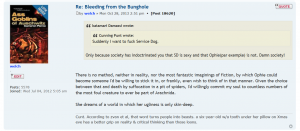You know how there’s something of a tension in feminism between different attitudes to “femininity”? To put it crudely, one view is that it’s just a set of (implicit) rules that keep women feeble and silly, while the opposite view is that disparaging femininity is patriarchal because it just amounts to seeing anything female as worthy of disparagement.
What about that? I tend toward the first view, but I also suspect that means I’m an unreconstructed dinosaur beached on the second wave and incapable of learning better.
But, I think the words (and what they express) are stupid, both of them – masculine as well as feminine. They’re advertising language, for one thing – have this masculine cologne at $3700 the ounce, don’t you love these feminine shoes in which you can break your ankle so easily.
But I probably dislike the word “feminine” more. Well what does it mean? It doesn’t mean strong (in any sense) or independent or adventurous or brilliant. What does it mean? (It’s a silly word, for a silly idea.) Dainty, delicate, pretty, fluffy. Conforming to gender norms if you’re a woman, a disgrace if you’re a man.
I get the point, that disliking what the word names is too much like disliking the female, but I don’t really believe it. I guess that’s because to me it’s always meant a trap.
Maybe rather than worrying about how to think about “femininity” we should just ditch the whole concept as too stupid to bother with.
Or, we could Google and find that Life Site News has opinions on the subject.
ROME, March 18, 2013 (LifeSiteNews.com) – On March 11th, a few days before the papal election, one of the Catholic world’s most eminent philosophers, Alice Von Hildebrand, celebrated her 90thbirthday. Von Hildebrand taught philosophy at a private, secular college in the US for 37 years, but is today perhaps best known as one of the leading proponents of the “New Feminism” that was brought to the fore under the papacy of John Paul II.
New Feminism, promotes the concept of the natural biological and complementarity of men and women, and opposes the “gender” ideology – along with abortion, contraception and sterilisation – of Second and Third Wave academic feminism. It is this type of feminism that von Hildebrand identified in an extensive 2003 interview as “the worst attack on femininity that has ever taken place in the history of the world”.
Well there you go. If the papacy likes it, I don’t have to.
Secularist feminism, still very much in ascendancy in politics and academia, advocates competition between the sexes for jobs and social advancement, looks upon motherhood as an obstacle to self-fulfillment and insists as a central tenet, on legalised abortion and artificial contraception to allow women to compete in the marketplace with men. And crucially for the new pope, it identifies the Catholic Church and the papacy as among its greatest enemies. Before the crowds had left the Piazza on Wednesday night, the world’s media were already carrying demands from the proponents of the feminist-inspired Sexual Revolution that the new pope overturn the Catholic prohibitions against abortion, birth control and homosexual activity.
Dang, the author of this piece – Hilary White – sure has a hard time with commas. But my point is, this is who thinks “femininity” is a real thing, and important.
In the last 40 years, there has been much talk among Catholics of creating a new “Christian feminism” that would assert the equal dignity of man and woman while maintaining the existence of differences between the sexes and upholding the sanctity of life and marriage. Perhaps among the greatest contributors to this discussion has been Alice von Hildebrand, whose books include, The Privilege of Being a Woman (2002), Man and Woman: A Divine Invention (2010).
In the 2003 interview with Zenit, von Hildebrand described academic, Marxist-based feminism as a kind of “trap” producing little more than misery. She said that the unintended consequence of feminist thought was to convince women that it was bad to be women.
The “amazing thing” about feminism, she said, was that “instead of making women more profoundly aware of the beauty and dignity of their role as wives as mothers, and of the spiritual power that they can exercise over their husbands, convinced them that they, too, had to adopt a secularist mentality”. This mentality, that she describes as “utilitarian” holds that human value is derived only from work and external accomplishment.
Ah yes the beauty and dignity of their role as wives as mothers, and of not having the freedom to choose anything else, in addition or instead. That’s “femininity” – being happy to be secondary and dependent.
Women “let themselves become convinced that femininity meant weakness. They started to look down upon virtues – such as patience, selflessness, self-giving, tenderness – and aimed at becoming like men in all things,” von Hildebrand said. This, she said, sparked the “war” between the sexes that we are all still suffering from today.
“Those who fell into the traps of feminism,” she continued, “became blind to the fact that men and women, though equal in ontological dignity, were made different by God’s choice: Male and female he made them. Different and complementary.”
And yet! There is Alice Von Hildebrand, doing something other than being a wife and mother…writing books telling other women to settle down to being wives and mothers.
Asked how women can claim the benefits of their natural inclinations, von Hildebrand said that while from a “naturalistic point of view,” men are “more creative, more inventive and more productive” as engineers, architects, philosophers and theologians, from God’s point of view all these works are “dust and ashes compared to every act of virtue”.
Women, she said, are not called to be “productive” in this material way, but every woman, whether married or unmarried, is “called upon to be a biological, psychological or spiritual mother.”
“She knows intuitively that to give, to nurture, to care for others, to suffer with and for them – for maternity implies suffering – is infinitely more valuable in God’s sight than to conquer nations and fly to the moon.”
It is to the lives and examples of the Blessed Virgin Mary and the woman saints that modern women can turn for guidance. These, she said, “teach us that an awareness and acceptance of one’s weakness, coupled with a boundless confidence in God’s love and power, grant these privileged souls a strength that is so great because it is supernatural.”
Fuck all that. Ima watch football and smoke cigars and throw sandwich crusts on the floor.
(This is a syndicated post. Read the original at FreeThoughtBlogs.)







